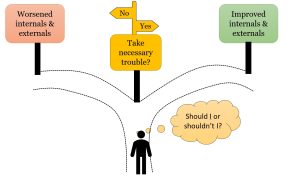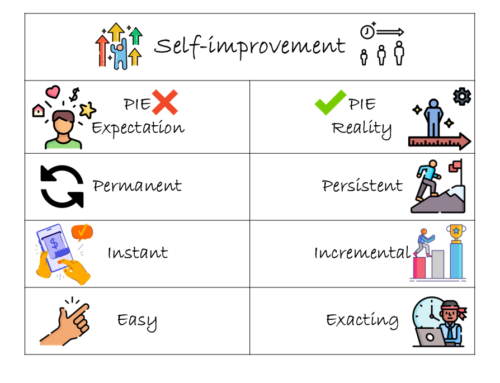
We don’t like trouble. To try to avoid problems reflects not only a sound survival instinct, but also an alert intelligence. For example, if we are driving on a road and see a pothole ahead of us, we can and should avoid the pothole whenever possible. But suppose we are driving for an important meeting to a remote place that can be accessed only through a pothole-filled road. If we obsess over avoiding potholes, we may never get to our destination.
What applies to a physical journey also applies to the journey of life. While we can and should avoid troubles in life whenever possible, there are many occasions when troubles are just unavoidable; not only that, such troubles may even be essential for our learning, growth and overall benefit. Trying to avoid those challenges may end up causing far greater trouble. For example, if a child refuses the difficulty involved in learning language, the child on growing up will face all the limitations that come with illiteracy — limitations that will include both external such as lesser career opportunities and internal such as lowered self-esteem. Similarly, if we have a talent for something, but if we refuse the commitment required to translate that talent into achievement, we will end up externally under-contributing and internally subjecting ourselves to negative emotions such as disappointment, envy and self-loathing.
When we thus realize that trying to avoid such necessary troubles leads to worsened externals and internals, we start accepting, not avoiding, those troubles that enable us to do better things and become better beings. Encouraging us to steel ourselves for making such choices, the Bhagavad-gita (18.37) assures us that the things that taste like poison will eventually taste like nectar.
One-sentence summary:
The more we try to escape life’s necessary troubles, the more we fill our life with unnecessary troubles.
Think it over:
- How can avoiding troubles impede us?
- How can avoiding troubles harm us?
- What can be a healthy focus for our life-journey?
***
18.37: That which in the beginning may be just like poison but at the end is just like nectar and which awakens one to self-realization is said to be happiness in the mode of goodness.
To know more about this verse, please click on the image



Face the trouble in life successfully, ,and then fancy the life